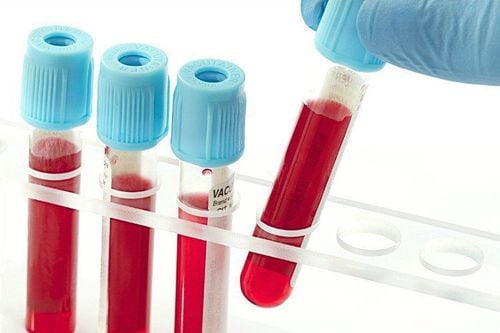This is an automatically translated article.
Mediterranean fever is one of the common diseases of autoinflammatory syndrome, also known as autoinflammatory disease.1. Definition of autoinflammatory disease
Autoinflammatory diseases, also known as autoinflammatory syndromes, include a group of diseases caused by disorders of certain genes and related to the body's immune system.The immune system is composed of cells and tissues that work together to protect the body against invading agents such as viruses, bacteria, and infections. The immune system consists of the adaptive immune system (producing antibodies) and the innate immune system (using white blood cells). Together, the immune system tries to identify, destroy, and eliminate invaders that cause damage to the body.
When you have an autoimmune disease, the natural immune system's response instead of destroying the invader signals the body to attack healthy tissue cells. It is this reaction that leads to episodes of intense inflammation most commonly characterized by fever, in addition to a rash or swelling of the joints.
Autoinflammatory syndrome also leads to an increased risk of amyloidosis, a protein that builds up in the blood and affects vital body functions.
It is important to distinguish between autoimmune and autoimmune diseases. Autoinflammatory diseases are abnormalities of the innate immune system, whereas autoimmune diseases are abnormalities of the adaptive immune system.

Sốt Địa Trung Hải là một trong những bệnh thường gặp của hội chứng autoinflammatory hay còn gọi là bệnh tự viêm
2. Some common autoimmune diseases and their symptoms
Some common autoinflammatory syndromes and their symptoms include: Familial Mediterranean fever (FMF): The disease causes periodic recurrent fever, abdominal pain, arthritis, chest tightness, skin inflammation. Neonatal-onset multisystem inflammatory disease (NOMID): The disease occurs in infants during the first 6 weeks of life, with symptoms of fever, rash, swelling in the lining of the brain, joint damage, vision loss, and loss of vision. hearing, intellectual disability. Tumor necrosis factor receptor-associated cyclic syndrome (TRAPS): This autoimmune disease can cause high fevers, stomach pain, chest or joint pain, skin rash, swelling in or around the eyes. Interleukin-1 receptor antagonist (DIRA) deficiency: This disease occurs in children and can cause serious symptoms such as swelling of bone tissue, bone pain and deformity, swelling of tissues around bone, rash on body skin. Behçet's disease: An autoimmune disease that can cause sores in the mouth or genitals, red and swollen eyes, arthritis, skin problems, and swelling in the digestive system, brain, and spinal cord. Atypical neutropenic dermatosis with lipodystrophy and elevated temperature (CANDLE): The disease consists of the following symptoms and usually develops during the first year of life such as recurrent fever, purpura of the skin, joint pain, permanent muscle cramps, growth retardation, loss of facial fat, swelling of the lips and eyelids. Hyperimmunoglobulin D Syndrome (HIDS): This autoimmune disease is caused by a mutation in the mevalonate kinase (MVK) gene and manifests as fever, lymphadenopathy in the neck, and a pink rash on the palms of the hands and feet.3. Diagnosis of autoimmune disease
Diagnosis of autoinflammatory disease is based on the following techniques:Blood tests: During acute inflammatory episodes of the disease, non-specific inflammatory responses are expressed by the protein C-reactive indices, erythrocyte sedimentation rate, and erythrocyte sedimentation rate. , blood levels of amyloid A, anemia, white blood cells and platelets increased. However, between episodes of remission, this reading is usually normal. Gene Sequencing: Gene sequencing is performed when a patient has test results and criteria that are sufficient for diagnosis but no genetic change is identified.

Xét nghiệm máu là một kỹ thuật quan trọng trong việc chẩn đoán bệnh tự viêm
4. Treatment of Auto-Inflammatory Disease
Treatment for autoimmune diseases may include certain medications to treat symptoms, such as reducing swelling and pain, and medications that affect the body's immune system.In a nutshell, autoinflammatory syndrome involves the body's natural immune system reacting to destroy healthy cells that cause inflammation, the typical symptom of which is fever. To ensure safety, patients need to go to a reputable hospital for examination and treatment as soon as there are signs of hypovolemic shock. Currently, Vinmec International General Hospital is one of the leading prestigious hospitals in the country, trusted by a large number of patients for medical examination and treatment. Not only the physical system, modern equipment: 6 ultrasound rooms, 4 DR X-ray rooms (1 full-axis machine, 1 light machine, 1 general machine and 1 mammography machine) , 2 DR portable X-ray machines, 2 multi-row CT scanner rooms (1 128 rows and 1 16 arrays), 2 Magnetic resonance imaging rooms (1 3 Tesla and 1 1.5 Tesla), 1 room for 2 levels of interventional angiography and 1 room to measure bone mineral density.... Vinmec is also the place to gather a team of experienced doctors and nurses who will greatly assist in diagnosis and detection. early signs of abnormality in the patient's body. In particular, with a space designed according to 5-star hotel standards, Vinmec ensures to bring the patient the most comfort, friendliness and peace of mind.
Please dial HOTLINE for more information or register for an appointment HERE. Download MyVinmec app to make appointments faster and to manage your bookings easily.













